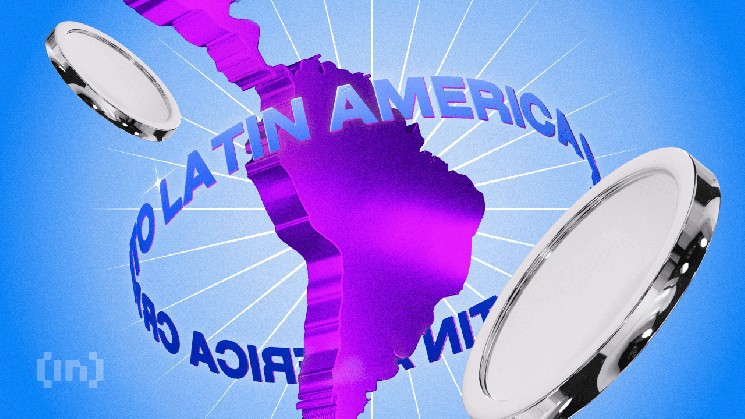LATAM Crypto Roundup: Brazil Announces Solana ETF Launch Date, Colombia Investigates Worldcoin, and More

BeInCrypto comprehensive Latam Crypto Roundup brings Latin America’s most important news and trends. With reporters in Brazil, Mexico, Argentina, and more, we cover the latest updates and insights from the region’s crypto scene.
This week’s roundup covers the spot Solana ETF launch in Brazil, an investigation by Colombia’s Superintendence of Industry and Commerce into Worldcoin’s operations, and more.
Brazil Takes Lead in Solana ETF Race
While the prospect of a Solana ETF (SOL) in the US remains uncertain, Brazil is moving ahead confidently. QR Asset Management announced that its Solana ETF will be available for public offering starting Wednesday, August 21. The ETF is set to be listed on Brazil’s B3 stock exchange on August 28.
Earlier this month, the Brazilian Securities Commission (CVM) approved the ETF, named QSOL11. Managed by Vortx, the fund will track the CCME CF Solana Dollar Reference Rate. The index, developed by CF Benchmarks and the Chicago Mercantile Exchange (CME), ensures reliable Solana pricing.
This launch marks another milestone for QR Asset, which already offers crypto-related products like QBTC11 and QETH11. The company views the new ETF as a regulated option for both institutional and retail investors in Brazil.
“As a market player, it is reassuring to have Brazilian regulators so attentive and open to the evolution of the crypto ecosystem in a regulated environment. The new ETF represents yet another regulated option for institutional and retail investors to diversify their portfolios and choose the ideal composition of their investments in the sector,” QR Asset Management CIO Theodoro Fleury stated.
QR Asset isn’t the only firm working on a Solana ETF in Brazil. The CVM has also approved another Solana ETF, backed by Hashdex in partnership with BTG Pactual. Hashdex, which manages over $962 million in assets, has already launched several ETFs on B3.
Matter Labs Expands zkSync Operations into Latam
Matter Labs, the developer behind the Ethereum Layer-2 (L2) scaling solution zkSync, announced its expansion into Latin America, starting with a headquarter in Buenos Aires, Argentina. The new office aims to support local projects while driving zkSync’s growth in the region.
The protocol has seen increasing adoption in Argentina, highlighted by integrations with platforms like the Lemon exchange and QuarkID, a digital identification system built on zkSync. These partnerships are set to catalyze zkSync’s influence across Latin America in the coming months.
Matter Labs’ CEO Alex Gluchowski and President Nana Murugesan plan to visit Buenos Aires in August to meet with key leaders, decision-makers, policymakers, and crypto entrepreneurs. The goal is to explore collaboration opportunities and better understand the region’s financial state.
“Argentina has become the springboard for our regional expansion, and I’m excited for the next phase of Matter Labs’ journey to bring millions of developers and the next billion users to the blockchain,” Murugesan stated.
Matter Labs highlighted that zkSync partners like Lambda Class and OpenZeppelin are positioning L2 solutions in Latin America. They described Argentina’s crypto ecosystem as “vibrant” and a key launchpad for Web3 projects in the region.
Salvadoran FinTech DitoBanx Enters Mexico
El Salvador-based FinTech company DitoBanx is entering the Mexican market to offer financial services, including international transfers, digital credit cards, dollar accounts, cryptocurrency access, and tokenization. After obtaining its operating license in El Salvador in April 2023, the company has extended its reach to Guatemala, the US, Costa Rica, Panama, and now Mexico in 2024. The company highlighted a 50% growth in financial technology app usage in Mexico over the past four years.
DitoBanx’s offerings in Mexico will include DitoWallet and credit card services for everyday transactions. The company will also offer tokenization services to convert physical or digital assets into tokens.
“With a firm belief that financial well-being is the foundation of a prosperous society, DitoBanx enters Mexico offering personalized service available 24/7, 365 days a year,” said Guillermo Contreras, CEO and founder of DitoBanx.
The company has reportedly invested $3 million in its Mexican operations, where mobile banking users have grown from 1.5 million in 2013 to 80 million by 2023.
Contreras highlighted the commitment to Mexico’s economic and technological growth. He also noted that they plan to integrate the digital Mexican peso and aim to operate under the legal framework of a Sociedad Financiera Popular (Sofipo) by 2025.
Peru Declares War on Cryptocurrency Crime
Peruvian authorities are ramping up efforts to combat cryptocurrency-related crime. While technological advancements and growing interest in cryptocurrencies have spurred their use, they have also brought concerns about potential criminal activities. Juan Carlos Villena Campana, Peru’s Public Prosecutor, has taken a firm stance on addressing these challenges.
Speaking at a workshop organized in collaboration with the US Department of Justice, Villena highlighted the importance of keeping pace with technological changes. He noted that while cryptocurrencies offer benefits like decentralization, they also pose risks due to the anonymity they afford, which can be exploited for illegal activities.
“The rapid evolution of technology and the growing adoption of cryptocurrencies have created new avenues for criminal activity, presenting fresh challenges to cybersecurity that threaten society,” Villena said in an interview with local media.
The Peruvian Public Prosecutor’s Office has committed to leading efforts against these crimes, working in collaboration with other Latin American nations and international organizations like the Organization of American States (OAS).
Rodrigo Silva from the OAS echoed Villena’s concerns, stressing the need for law enforcement to stay updated on technological advancements to tackle the increasingly complex nature of cybercrime, even when it occurs on blockchain networks.
Colombia Investigates Worldcoin for Alleged Data Protection Violations
The Colombian Superintendence of Industry and Commerce (SIC) has launched an investigation into Worldcoin and Tools for Humanity Corporation, the platform behind WLD, for allegedly violating personal data protection laws. The investigation, initiated by resolution N. 46436, focuses on ensuring that Worldcoin’s data processing practices comply with Colombia’s regulations on sensitive personal data.
The SIC is specifically concerned with Worldcoin’s transparency in handling personal data, the implementation of security policies, and the existence of internal procedures for addressing complaints and queries from Colombian citizens. The regulator emphasized the importance of ensuring that the community remains cautious about sharing their personal data.
“The SIC del Cambio is committed to protecting the fundamental rights of citizens and advises the community to exercise caution with their personal data. This decision is in the process of being notified and will be signed once it is known by the involved parties. No appeal can be lodged against this decision,” the SIC stated.
As of now, neither Worldcoin nor Tools for Humanity Corporation has commented on the investigation. However, if violations of data protection laws are confirmed, Worldcoin could face hefty fines or even be banned from operating in Colombia.
The Superintendency clarified that potential sanctions under Article 23 of Law 1581 of 2012 could include fines of up to 2,000 current legal monthly minimum wages, the suspension of activities for up to six months, the temporary closure of operations after the suspension, or the immediate and definitive closure of operations involving the processing of sensitive data.
As the Latam crypto scene grows, these stories highlight the region’s increasing influence in the global market. Stay tuned for more updates and insights in next week’s roundup.




 Bitcoin
Bitcoin  Ethereum
Ethereum  Tether
Tether  USDC
USDC  Dogecoin
Dogecoin  TRON
TRON  Cardano
Cardano  Chainlink
Chainlink  Stellar
Stellar  Bitcoin Cash
Bitcoin Cash  LEO Token
LEO Token  Hedera
Hedera  Litecoin
Litecoin  Monero
Monero  Dai
Dai  OKB
OKB  Cronos
Cronos  Ethereum Classic
Ethereum Classic  Gate
Gate  VeChain
VeChain  Cosmos Hub
Cosmos Hub  Algorand
Algorand  KuCoin
KuCoin  Stacks
Stacks  Tether Gold
Tether Gold  Zcash
Zcash  Theta Network
Theta Network  IOTA
IOTA  Tezos
Tezos  TrueUSD
TrueUSD  NEO
NEO  Ravencoin
Ravencoin  Polygon
Polygon  Dash
Dash  Decred
Decred  Synthetix Network
Synthetix Network  Zilliqa
Zilliqa  Qtum
Qtum  0x Protocol
0x Protocol  Basic Attention
Basic Attention  Siacoin
Siacoin  Holo
Holo  DigiByte
DigiByte  Enjin Coin
Enjin Coin  Nano
Nano  Ontology
Ontology  Status
Status  Hive
Hive  Waves
Waves  Lisk
Lisk  Pax Dollar
Pax Dollar  Steem
Steem  Numeraire
Numeraire  BUSD
BUSD  NEM
NEM  Huobi
Huobi  OMG Network
OMG Network  Bitcoin Gold
Bitcoin Gold  Ren
Ren  Bitcoin Diamond
Bitcoin Diamond  Energi
Energi  Augur
Augur